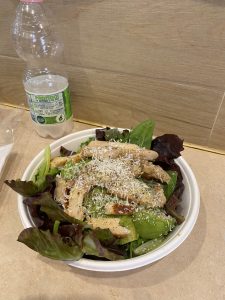Written by: Aidan Gregg | Summer 2022
Nemea Center for Classical Archaeology Field School
It’s 95 degrees there are no clouds in the sky to protect you from the sun. You’ve been working deep in a trench with a pickaxe for four hours and there’s no end in sight. Whenever the wind blows over the dig site, you’re blinded by dirt and dust. Did I mention how hot it is?
Before I came to Greece, I had no idea what archaeology would be like. To say the very least, I’m not built for physical activity. My idea of a good time is sitting in the library, reading the same translation of the Illiad for the fifth time. Demanding manual labor for hours in the hot sun? Absolutely not. But something about archaeology was different.
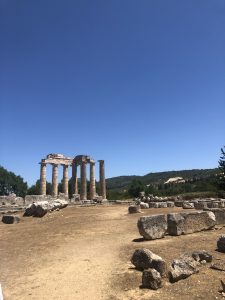
The temple of Nemean Zeus
My study abroad journey took me to Nemea, the mythological home of the Nemean Lion, which the hero Heracles slew as the first of his 12 labors. Surrounded on all sides by ancient history, twelve students, including myself, participated in an archaeological dig. To the East is the ancient stadium where the Nemean games took place, one of the four Panhellenic Games. To the West is the shrine of Opheltes, an ancient structure dedicated to the cult worship of the hero. And to the North is the Temple of Nemean Zeus, where athletes once honored the king of the gods.
Our excavation took place in the remains of an early Christian basilica, built atop an ancient xenon, a hotel where visitors to the sanctuary would stay in ancient times. The purpose of our excavation was to uncover the walls of this site that were previously excavated and backfilled so they could be preserved for future viewing. Slowly but surely, over the span of four weeks, we revealed more and more of the structure, including the remains of an ancient aqueduct, and had made our way over a meter below the surface. As we were digging, we were also taking pictures of the site, creating scale drawings of the trenches and the walls, and recording everything for future generations of scholars to look back on and learn from.
I can’t stress enough how brutal the work is. You’re hot, sweaty, sunburned, and every inch of your body is covered in dust. But after a long day, nothing beats the feeling of satisfaction as you look at all the things you’ve found and all the dirt you’ve moved. The only thing that compares is the delight of feasting on homemade Greek food after work.
Of course, the fun doesn’t stop in the field. Every few days, we got the chance to work in the back rooms of the on-site museum and escape the heat. I spent most of my time in the museum piecing through pottery sherds (as opposed to “shards,” which refer to glass fragments) in order to identify what kinds of vessels they came from and when they were made. This involved searching through massive, dilapidated catalogs of pottery found during previous excavations to find comparanda, other objects that were similarly made and produced at the same time. I was shocked by how much one could learn about a pot with only a small piece of it.
But why is it important to know what kind of pot a silly little sherd came from and when it was made? I asked the same question. We had thousands of pieces of pottery whose pots had been lost to time, how could they be that important?
The answer is context. Each type of pot we can identify provides us with more context about how the archaeological site was used. For example, if we found a lot of sherds with a texture like sandpaper, a few inclusions like small stones, and evidence of burning, we would know that these pots were used as cookware. Therefore, we could determine that there was a lot of cooking going on at that site. Thus, we can learn more about the activities of ancient humans at that place, at that time.
Or, if we found a large portion of decorated fine ware sherds from closed vessels, like a lekythos, a pot used for storing oil for religious ceremonies, we would be able to learn more about a site’s use in a religious context. But what if we were to find out that many of those sherds were severely burned? In that case, we would have cause to believe that there was a fire at that site thousands of years ago.
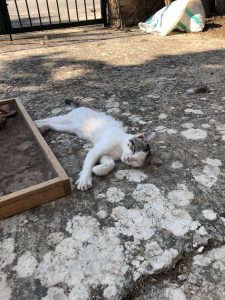
A mischievous kitten, Fluff
The hardest part of working in the museum wasn’t looking through volumes of comparanda or handling delicate thousand-year-old objects. It was watching the kittens.
Our museum had three kittens, Peanut butter, Marshmallow Fluff, and Nutella, born a few weeks before the start of the field school season. These adorable balls of fluff were absolute menaces to the order of the museum. We had to be in a state of constant vigilance around the kittens to ensure they weren’t trying to jump onto a table to play with bones, trying to knock down the racks of drying pottery or engaging in other shenanigans. The stress of keeping the kittens out of trouble paled in comparison to the joy of getting to play with them every day. Of all the things I miss about my time in Greece, those kittens are at the top of the list.
This is only a tiny glimpse into the world of archaeology. Over a dozen specialized fields like paleoethnobotany, bioarchaeology, landscape archaeology, and underwater archaeology, provide even more insight into the ancient world. If you want to learn more about the field of archaeology, check in with the Department of History, Anthropology, and Classics, or Butler’s resident archaeologist, Dr. Kvapil. You could even get involved with Butler’s Ancient Mediterannean Cultures and Archaeology lab. And if you’re ready for it, go out in the field and get dirty!
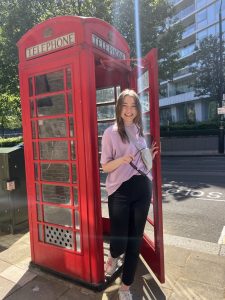 I had the privilege of studying abroad this summer in London, England on the Healthcare Delivery in the United Kingdom program and in Florence, Italy on the History and Culture of the Mediterranean Diet program. By completing these two study abroad programs, I was able to gain six credit hours that go towards pharmacy school electives. Earning credit hours will help me immediately by having to take less hours down the road, but these experiences granted me so much more.
I had the privilege of studying abroad this summer in London, England on the Healthcare Delivery in the United Kingdom program and in Florence, Italy on the History and Culture of the Mediterranean Diet program. By completing these two study abroad programs, I was able to gain six credit hours that go towards pharmacy school electives. Earning credit hours will help me immediately by having to take less hours down the road, but these experiences granted me so much more.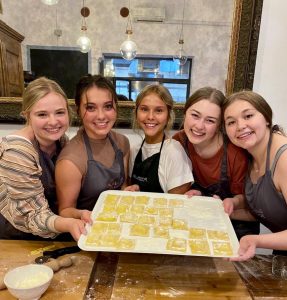 For example, in London, we learned all about how the healthcare system works in England, so we were able to compare their system with how the United States’ system works. Now, I will be able to bring my knowledge with me to wherever I may end up in my future career and focus on the things that worked well in the United Kingdom and what already works well here in the United States. In Florence, we learned all about the Mediterranean Diet and healthy living. Not only will I be able to apply these healthy living habits to my own life, but also into my future patient’s lives as well. Not very many people have the opportunity to gain a global perspective for their future career, so it is a very appealing quality when searching for a future job.
For example, in London, we learned all about how the healthcare system works in England, so we were able to compare their system with how the United States’ system works. Now, I will be able to bring my knowledge with me to wherever I may end up in my future career and focus on the things that worked well in the United Kingdom and what already works well here in the United States. In Florence, we learned all about the Mediterranean Diet and healthy living. Not only will I be able to apply these healthy living habits to my own life, but also into my future patient’s lives as well. Not very many people have the opportunity to gain a global perspective for their future career, so it is a very appealing quality when searching for a future job.
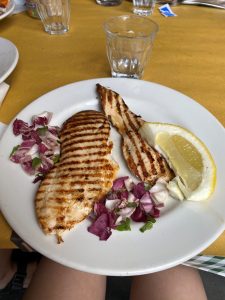 myself than I would have ever imagined. In the past two years, my love for health and food has drastically increased. Two years ago, I discovered that I had to go gluten free for medical reasons. If I ate anything containing gluten, I would fall asleep almost instantly. For years, I have been trying to eliminate foods that would make my body worse. This trip gave me the ability to find foods that could fuel my body to make it stronger. I learned all about the Mediterranean Diet, and I believe it is a diet that many people could easily follow and stick with. When I thought about what a healthy dinner should consist of, I always pictured some form of meat as the main dish with a side of vegetables. Now after studying abroad, I learned that meat does not have to be the main source of nutrients.
myself than I would have ever imagined. In the past two years, my love for health and food has drastically increased. Two years ago, I discovered that I had to go gluten free for medical reasons. If I ate anything containing gluten, I would fall asleep almost instantly. For years, I have been trying to eliminate foods that would make my body worse. This trip gave me the ability to find foods that could fuel my body to make it stronger. I learned all about the Mediterranean Diet, and I believe it is a diet that many people could easily follow and stick with. When I thought about what a healthy dinner should consist of, I always pictured some form of meat as the main dish with a side of vegetables. Now after studying abroad, I learned that meat does not have to be the main source of nutrients.